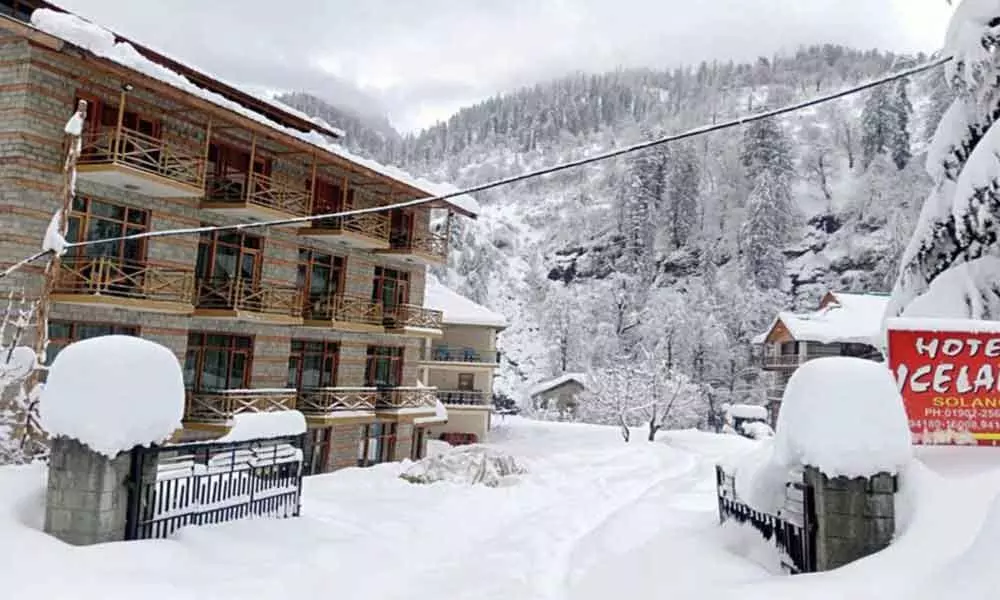Live
- Tender apology to CM, mantri tells Allu Arjun
- CM condemns attack on Allu Arjun’s house
- Allu Arjun’s house attacked, police arrest 6 persons in city
- APSRTC to replace diesel buses with electric buses
- Komatireddy brothers should get Oscar for lying: BRS
- KTR asks farmers to up the ante against TG govt
- SCB residents raise pitch for fair compensation for acquired lands
- TGMC crackdown on quackery continues, over 400 FIRs filed
- TG seeks PMAY fund boost as 80pc of State turns urban
- Don’t buy assets from known ganja smugglers: DIG
Just In

It's silence for the gods in 10 villages dotting the outskirts of the picturesque hill resort of Manali, currently marooned under a blanket of snow For 41 days, silence will reign in these villages as locals have switched on the mute button, silencing their radios and even mobile ringtones.
It's silence for the gods in 10 villages dotting the outskirts of the picturesque hill resort of Manali, currently marooned under a blanket of snow
For 41 days, silence will reign in these villages as locals have switched on the mute button, silencing their radios and even mobile ringtones.
This 'do not disturb' policy has been religiously followed for long in Goshal, Shanag and eight other tiny hamlets -- with a population less than 10,000 -- in Kullu district, some 250 km from the state capital.
The villagers also don't allow honking on village roads, or visitors to talk loudly.
The silence, that begins every year on Makar Sankranti (January 14/15), continues till the end of the month of 'Magh'. This year, it will end on February 24.
During this period, the locals also avoid listening to music, watching television or doing the kind of household chores and work in the fields that make noise.
The reason behind the practice is the belief that the Gods -- Gautam Rishi, Ved Vyas Rishi and Kanchan Nag, a serpent deity -- whose temple is located in Goshal village, four kilometres from upper Manali, are meditating.
Legend has it that the chief deity, Gautam Rishi, meditated where the temple is situated.
Every year on Makar Sankranti, the centuries-old temple, exemplifying typical hill architecture, closes down.
It will be reopened when the deities are supposed to return from their winter sojourn. During this period, no religious ceremony is performed in the temple, priest Hari Singh shares.
In line with tradition, the Gautam Rishi temple is closed after spreading earth inside and planting a seed in a pot full of soil kept close to the idol. Locals believe that if a flower has surfaced on the soil when the temple reopens, it is an augury of happiness for villagers in the coming year.
Instead, the appearance of charcoal signifies that the village is in store for some fire-related tragedy. Grain indicates a good harvest.
"When the temple is reopened, a prediction will be made on the basis of the sacred mud spread inside the temple," the priest said.
The other villages where this tradition is followed include Solang, known for its ski slopes, Kothi, Majhach and Palchan in the Ujhi Valley.
The picturesque Kullu Valley is famous for its ancient shamanistic traditions that govern the lives of the ethnic communities. As per a study conducted, there are the 534 gods and goddesses in the Kullu Valley who are said to be "alive".
According to "A reference book on Kullu Devtas" compiled by the local administration, the gods "live" among the people. They have families and relatives living among the local people who join them in the celebrations.

© 2024 Hyderabad Media House Limited/The Hans India. All rights reserved. Powered by hocalwire.com







